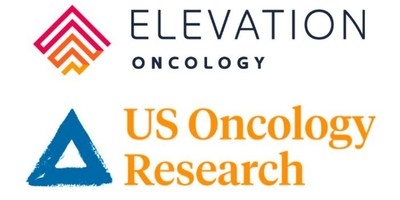Elevation Oncology, a clinical stage biopharmaceutical company focused on the development of precision medicines for patients with genomically defined cancers, and US Oncology Research, one of the largest community-based oncology site management organizations in the U.S., announced today a collaboration to utilize the US Oncology Research Selected Trials for Accelerated Rollout (STAR) program for patient enrollment in the registration-enabling Phase 2 CRESTONE study
|
NEW YORK and THE WOODLANDS, Texas, Sept. 30, 2020 /PRNewswire/ -- Elevation Oncology, a clinical stage biopharmaceutical company focused on the development of precision medicines for patients with genomically defined cancers, and US Oncology Research, one of the largest community-based oncology site management organizations in the U.S., announced today a collaboration to utilize the US Oncology Research Selected Trials for Accelerated Rollout (STAR) program for patient enrollment in the registration-enabling Phase 2 CRESTONE study for patients with solid tumors of any origin that have an NRG1 gene fusion. "The ability to accurately detect rare genomic driver alterations in a patient's tumor and subsequently open up a clinical study site in response, is paramount to bringing precision therapy opportunities to patients that may benefit from treatment," said Shawn Leland, PharmD, RPh, Founder and Chief Business Officer of Elevation Oncology. "US Oncology Research is ideally positioned to expand the reach of the CRESTONE study for patients with cancers harboring an NRG1 gene fusion for investigational treatment with seribantumab. A key component of this collaboration is the ability to quickly open CRESTONE clinical trial sites via the US Oncology Research STAR program, which minimizes patient travel and disruption in clinical care, a major advantage particularly given the current travel complexities due to COVID-19." The STAR program opens and activates clinical trials quickly across all cancer research sites managed by US Oncology Research. STAR is an operational model that allows for pre-screening of potentially eligible subjects upfront and only opens sites where subjects are identified. When a potential STAR trial patient is identified at a facility, the practice is trained in the details of the trial, and the study is opened within a two-week timeframe at the location where the patient will be treated. "Advancements in diagnostic testing, and an evolution in the understanding of cancer development and progression, have enabled the identification of driver mutations and subsequent treatment for patients with cancer that no longer is associated with the tissue of origin for a particular disease," said Robert L. Coleman, MD, Chief Scientific Officer of US Oncology Research. "Given the broad reach of US Oncology Research, we are able to provide access to investigational treatments at a local medical center and rapidly open up clinical study sites in order to provide options for our patients and physicians in their clinical treatment decisions across the country. With close collaboration between our individual cancer specialists, we are creating a future where cancers that are defined by genomic driver alterations can be rapidly identified and matched to treatments that may be able to stop the growth of an individual patient's disease, wherever they may live." US Oncology Research enables practices to offer patients access to the latest cancer clinical trial options in their local communities, providing the opportunity for better outcomes while contributing to the advancement of cancer treatment. US Oncology Research serves approximately 60 research sites and more than 165 locations, managing about 400 active trials at any given time. This breadth of coverage, and commitment to cross-disciplinary collaboration among facilities and individual specialties, makes US Oncology Research uniquely situated to accelerate the clinical development of precision medicines that target rare genomic alterations. Patients and physicians can learn more about the CRESTONE study at www.nrg1fusion.com or on www.ClinicalTrials.gov under the NCT number NCT04383210. About Elevation Oncology About US Oncology Research About Seribantumab and NRG1 Gene Fusions NRG1 fusions have been identified in a variety of solid tumors, including lung, pancreatic, gallbladder, breast, ovarian, colorectal, neuroendocrine, and sarcomas. In preclinical experiments, seribantumab prevents the activation of HER3 signaling in cells that harbor an NRG1 gene fusion. In addition to extensive nonclinical characterization and testing, seribantumab has been administered to 847 patients across 12 phase 1 and 2 studies, both as a monotherapy and in combination with various anticancer therapies. Seribantumab is currently being clinically tested in the Phase 2 CRESTONE study for patients with solid tumors of any origin that have an NRG1 fusion. About the CRESTONE Study Media Contacts US Oncology Research
SOURCE Elevation Oncology & US Oncology Research |





